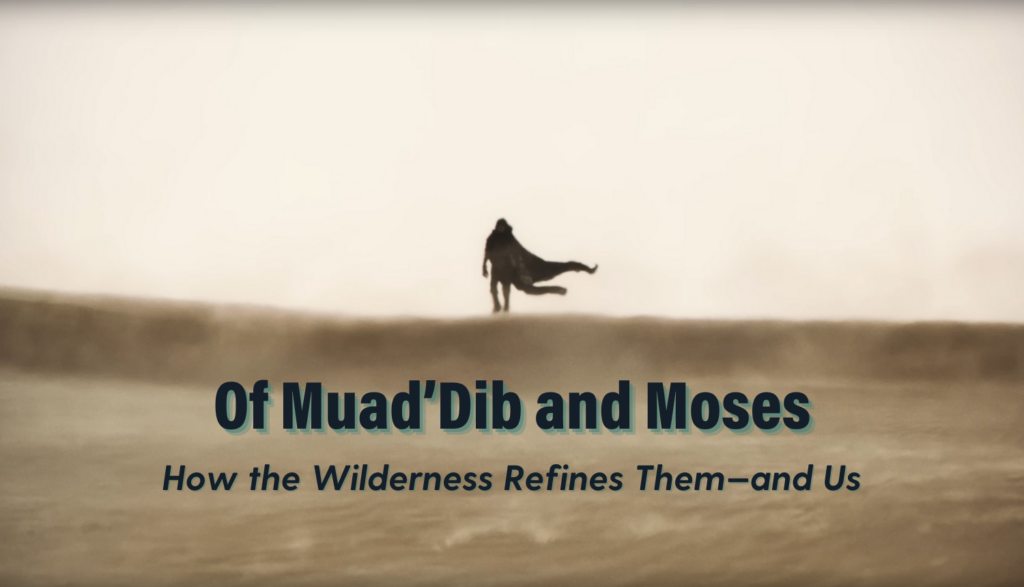Just a few days into its run, and Dune: Part Two is already being called the year’s first real blockbuster. Based on Frank Herbert’s bestselling book Dune and revolving around the early exploits of Paul Atreides (played by Timothée Chalamet), Dune: Part Two is filled with spectacle, nuance, some notable problems—and religion.
It’s not Christian, mind you. It’s literally worlds away from anything you’ll read in the Bible. And yet, Dune: Part Two contains some powerful echoes of Christian faith—currents that run underneath its dunes like its fearsome sandworms. Squint in the desert sun a bit, and Paul Atreides—the man who would come to be called Muad’Dib—looks a little like … Moses.
Let me show you what I mean.
Early in Dune: Part Two, hero Paul Atreides whispers to himself that Arrakis is a “world beyond cruelty.”
He’s not wrong. The planet is almost completely devoid of water—so much so that the native Fremen refuse to cry for fear of losing even a drop. Gigantic sandworms burrow underneath, ready to swallow anything that moves. Everything can kill in this place, it seems: the heat, the thirst, the beasts, the people.
And Paul—a pampered lord from a distant planet—must somehow survive here.
Paul was born into House Atreides, one of the galaxy’s most powerful families. Paul’s father, Duke Leto, was sent to Arrakis to keep the spice mélange—the galaxy’s most powerful product—flowing.
Alas, the galactic emperor betrayed Leto. He joined forces with House Harkonnen (the Atreides’ centuries-old rivals) and tried to destroy the entirety of House Atreides. He very nearly succeeded, too. But Paul and his mom managed to escape into the desert, soon falling in with a group of Fremen (the native people of Arrakis). Good thing, too. Because the only way either will survive on the planet is by learning how the Fremen have for all these millennia.
Paul’s own goals in this wilderness are pretty modest. He’d like to just survive, for one thing—and at first that seems pretty unlikely. He’d like to learn the ways of the Fremen. And sure, he’d like to ultimately get back at the emperor and House Harkonnen, but that’s down the road. And when he picks his Fremen name, he chooses Muad’Dib—the Fremen name for Arrakis’ humble kangaroo rat.
But fate has other plans.
Early on—before Paul even knows how to walk on the sand properly–some of the Fremen look to Paul as a potential messianic figure (thanks to centuries-worth of prophecies planted there by shadowy “missionaries”). Paul learns not just how to survive, but how to thrive in that desert. He learns what it means to be a Fremen. And as the story goes on, more and more of those Fremen turn toward Paul as the one who will lead them to “paradise.”
Dune: Part Two focuses on Paul’s improbable rise from stranger to leader to, ultimately, the messiah figure he never wanted to be.
Moses never wanted to be a leader of people, either. He, like Paul, was once a pampered prince—living a life of luxury in Egypt. But he, too, was thrown into the wilderness. He spent 40 years there as a shepherd, growing skills that he never would’ve needed in the halls of the palace. He learned how to survive in the wilderness. He, ultimately, built a life there.
And then Moses runs into a Burning Bush. And despite offering up a ton of reasons why he shouldn’t go back to Egypt and lead the Hebrews there to freedom, Moses is sent anyway—to bring his people to God’s Promised Land, a land of milk and honey. Paradise.
Moses and his followers spent another 40 years in that desert, wandering while they waited for God to open the door. And my guess is Moses—like Paul “Maud’Dib” Atreides—needed all the skills he learned during his first go-run there to lead his people home.
Funny how God sometimes uses the worst of environments to teach us, isn’t it?
We live in a fallen world—a world that, as Paul says, can feel “beyond cruelty.” Sometimes, like Paul, we’re rocked by betrayal. Sometimes, like Moses, we feel cast out. We suffer horrific losses. We grieve. It can feels as though our worlds are turned upside down, that we live in a land of pain.
And sometimes, it’s in that metaphorical wilderness that we learn to thirst for the living water—the only water that might save us.
We all walk through the wilderness at times in our lives. It’s terrible, no doubt. But those horrific times can, ultimately, be times of opportunity, too—if we let them be. Of growth. Of preparation for what we might be called to do next.
Moses needed his time in the desert to prepare him for what was to come. So did Muad’Dib. And so—as hard as it is to say, and as hard as it is to suffer—do we all.








2 Responses
Good article.
Good post. This was why I was sitting during the movie asking, “Are ‘kwisatz haderach’ and ‘Bene Gesserit’ Hebrew terms?”